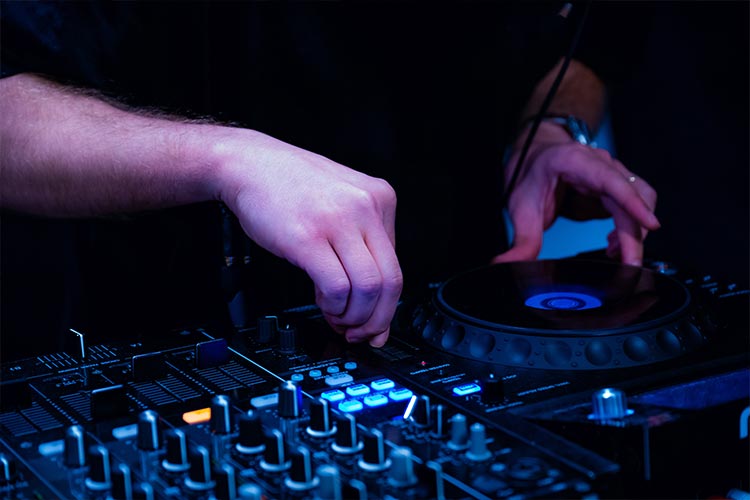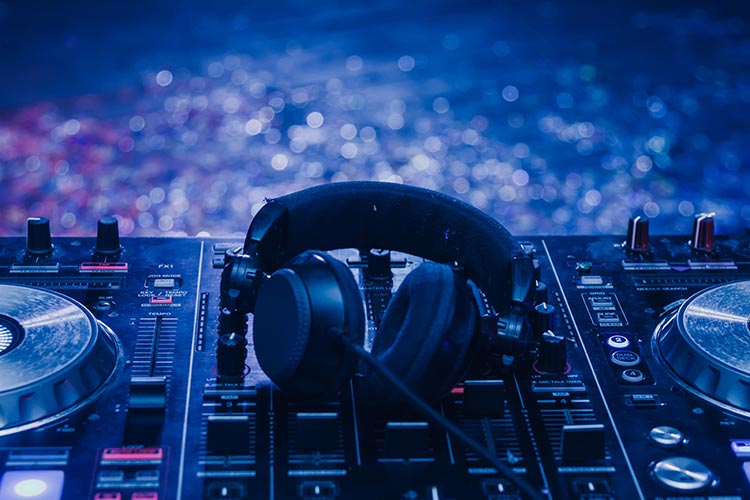

The History of EDM and the Atlanta Influence
Date Posted: September 5th, 2024
Where did this upbeat, rhythm-driving, emotion-stirring music called Electronic Dance Music (EDM) come from? Who and what were the early influences of EDM? And why does it give us such a rush, make our bodies move, almost as if we were puppets on a funky string?


EDM covers a broad range of percussive electronic music genres. There are many varieties, many versions, many levels, of EDM, but all are centered around inspiring movement. Primarily produced to provide us with an exhilarating or emotional experience, the music style has found its niche in the entertainment industry, reverberating through venues and across crowds of pleasure-seekers in places such as nightclubs and festivals, finding its way quickly into our homes and hearts.
The history of EDM is a tale of innovation, cultural exchange, and technological evolution that spans several decades and continents, including significant contributions from the American South, particularly Atlanta, Georgia.
The Early Days of EDM
The roots of EDM can be traced back to the 1970s, those glorious, heady days of experimentation and freedom. Electronic instruments began to infiltrate the music scene, the synthesizer, drum machine, and sequencer becoming the backbone of electronic music. In the late 70s and early 80s, genres like disco and electro came blazing onto the scene, utilizing electronic elements in a way that excited people, got them moving in a whole new way to a whole new beat, paving the way for the rise of EDM.
During this time, Detroit and Chicago played pivotal roles in the development of techno and house music, respectively. The current day Gen Xer’s seized this new wave of music, becoming ‘entranced’ with the building hype in the building beats and Chicago house music, with its repetitive 4/4 beats and synthesized basslines, became a foundation for future EDM genres. Detroit techno, darker and more mechanical, also heavily influenced the EDM landscape.
The Rise of EDM in the 90s – enter Atlanta
The 1990s brought an explosion of electronic music into the mainstream. Rave culture, originating in Europe, began to spread globally, including to the United States. This period saw the rise of subgenres such as trance, house, and drum and bass, each contributing their own unique threads to the rich tapestry of EDM.
In the U.S., cities like New York, Los Angeles, and Miami became early hubs for electronic music. It was at this time that Atlanta, Georgia, started to bang its own drum in the EDM scene. Known primarily for its contributions to hip-hop, Atlanta’s music industry in the 90s embraced electronic influences. The city became a melting pot where genres like Southern hip-hop began to blend with electronic sounds, charting a course for the future of EDM in the city of trees.
The 2000s and the EDM Eruption
The early 2000s witnessed the global explosion of EDM. The dawn of digital production tools and quick advancement of the technology involved made it easier for artists to create and distribute music, leading to an outpouring of new talent. Genres like dubstep, electro house, and progressive house rose in popularity all over the world.
During this time, Atlanta's music scene continued to evolve, with electronic influences becoming more pronounced. Atlanta-based producers and DJs began to experiment with EDM, integrating it with the city's strong hip-hop tradition. The emergence of trap music, a genre that originated in Atlanta, played a crucial role in this evolution. Trap, characterized by its heavy use of 808 drum machines and fast hi-hats, merged seamlessly with EDM, giving rise to "trap EDM," a subgenre that gained global acclaim.
Atlanta's Influence and where we are now
In the 2010s, Atlanta became an unexpected hub for EDM innovation. The city's rich musical history, coupled with its embrace of new sounds, fostered a vibrant electronic music scene. Major artists, such as Kaskade, Skrillex, and Diplo, began collaborating with Atlanta-based rappers and producers, blending EDM with Southern hip-hop elements to the delight of crowds of nightclub-goers looking for the next rush in musical progression.
Music festivals also played a significant role in solidifying Atlanta's place in the EDM world. Events like TomorrowWorld, held in nearby Chattahoochee Hills, drew tens of thousands of EDM fans from around the world, establishing Atlanta as a key destination for electronic music lovers.
As EDM continues to evolve, Atlanta remains a dynamic and influential force. The city's inherent ability to merge musical styles has not only shaped the sound of modern EDM but has also given the genre a push into new and exciting directions. Today, Atlanta's impact on EDM is evident as local artists continue to break the mold, experimenting with fusing hip-hop, trap, Latin, and other styles. District Atlanta is at the heart of this fusion, bringing to the stage a range of EDM that crosses cultures and styles, ensuring that the city remains at the forefront of electronic music innovation.

